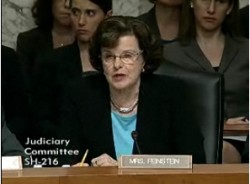Senators Begin Opening Statements at Kagan Confirmation Hearing

Sen. Dianne Feinstein makes her opening
statement Monday. Screen shot from
Senate Judiciary Committee live webstream.
The nomination of Elena Kagan to the U.S. Supreme Court goes before the Senate Judiciary Committee today, the same day the high court is wrapping up its 2009-10 term and bidding adieu to retiring Justice John Paul Stevens.
The Judiciary Committee even tailored its schedule to accommodate a rare instance when a confirmation hearing for a Supreme Court nominee will virtually overlap the end of a high court term. The justices convened at 10 a.m. to issue their last opinions of the term, while the committee begins at 12:30 p.m. ET across the street in the Senate Hart Office Building.
Kagan, 50, was nominated May 10 by President Barack Obama to succeed Justice Stevens, who is stepping down after 35 years on the court. Kagan served as a law clerk to Justice Thurgood Marshall in 1988-89, was a White House aide to President Bill Clinton for four years, and was a professor and dean of Harvard Law School before being tapped by Obama last year to be U.S. solicitor general. (She stepped aside from that position upon her nomination.)
Aside from the usual flurry of initial news stories, the nomination has largely faded into the background of public consciousness amid the oil leak crisis in the Gulf of Mexico. Kagan appears to be on track for confirmation in the Democratic-controlled Senate, although Republicans last week stepped up their criticism of the nominee.
Besides Kagan’s lack of judicial experience, opponents have focused on her (relatively brief) record dealing with abortion issues as a law clerk to Justice Marshall and when she was in the Clinton White House, as well as on her handling of the issue of military recruiters while dean of Harvard Law School.
Sen. Jeff Sessions of Alabama, the ranking Republican on the Judiciary Committee, has steadily criticized Kagan’s nomination, although he says she merits a “fair and full hearing.”
“A troubling pattern has already emerged in Ms. Kagan’s record,” Sen. Sessions said in a June 18 statement. “Throughout her career, she has demonstrated a willingness to make legal decisions based not on the law but instead on her very liberal politics.”
Sen. Patrick Leahy, D-Vermont, the chairman of the Judiciary Committee, said last week that too many of the Senate’s 41 Republicans “seem predisposed to oppose the nomination.”
“If confirmed, Elena Kagan would be the third member of the current Supreme Court to have had experience working in all three branches of the [federal] government prior to being nominated,” Leahy said on the Senate floor June 21. “Some have criticized her work during the Clinton administration as political. I suggest that a fair reading of her papers indicates that she has the ability to take many factors into account in analyzing legal problems and that her skills include practicality, principle, and pragmatism.”
Last week, eight former U.S. solicitors general who served Republican and Democratic presidents came out in favor of Kagan’s nomination, saying in a letter to the Judiciary Committee that she would “bring to the Supreme Court a breadth of experience and a history of great accomplishment in the law.”
The letter (PDF) was signed by, among others, Charles Fried, a solicitor general under President Ronald Reagan; Kenneth W. Starr, who served under President George H.W. Bush; Drew S. Days III, who served under President Clinton; Walter Dellinger, an acting solicitor general under Clinton; and Theodore P. Olson, who held the post under President George W. Bush.
Former U.S. solicitor general Robert Bork, whose nomination for the Supreme Court by President Reagan failed in 1987, did not to sign the letter. Last Wednesday, Bork told a telephone press conference organized by the group Americans United for Life that Kagan, while having a “moderate, very pleasant demeanor,” has not “had time to develop a mature philosophy of judging.”
“The academic world is not a place where you learn prudence and caution and other virtues of a judge,” Bork said. Former acting solicitor general Barbara Underwood, now New York solicitor general, didn’t sign it either.
Kagan, a native of New York City, will nonetheless be introduced at her confirmation hearing by the two U.S. senators from Massachusetts, Democrat John Kerry and Republican Scott Brown. She was a resident of that state before joining the Obama administration.
Among the other witnesses that will appear during the hearing, which is expected to last the week, are Standing Committee Chair Kim J. Askew and William J. Kayatta Jr., First Circuit Representative, of the ABA’s Standing Committee on the Federal Judiciary. The committee last week unanimously (with one abstention) gave Kagan its highest rating of well qualified.
More on Kagan:
View the hearing live at the Senate Judiciary Committee’s website.



